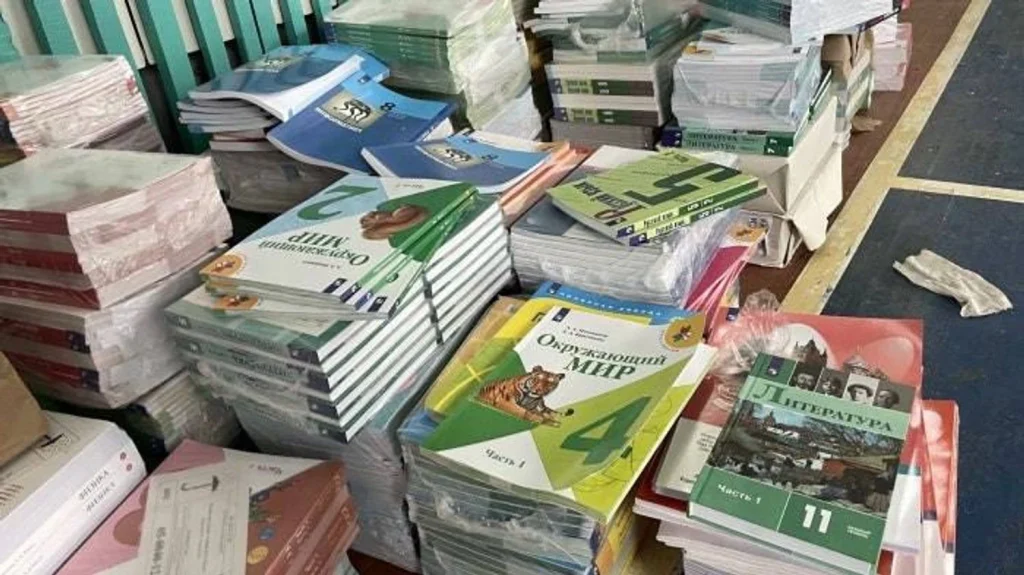Listen to the article
Russian authorities are revamping school textbooks with a “patriotic” focus that critics say serves as a tool for state propaganda, according to a recent report by the Center for Countering Disinformation (CCD).
Representatives from the Moscow Pedagogical University announced plans to create new “unified” textbooks for Russian language and literature classes that will feature a “patriotic, nationally oriented approach.” The announcement came during a meeting of the Federation Council of the Russian Federation, Russia’s upper house of parliament.
According to the CCD report, the textbook authors have openly declared their intention to “educate citizens interested in preserving the Russian language” and “strengthen spiritual and moral values” through the new educational materials.
The curriculum changes extend beyond simple language instruction. The revised textbooks will include new sections on “Literature of the Peoples of Russia” and a feature called “Literary Map of Russia,” both apparently designed to emphasize Russian cultural identity. Coverage of the “Great Patriotic War” – Russia’s term for its involvement in World War II – will also be expanded, reinforcing a narrative that has long been central to Russian national identity.
Perhaps most tellingly, even the section on international works will be reframed through a Russian lens. The standard “Foreign Literature” section will be renamed “Foreign Literature in Russian Translations,” shifting focus to Russia’s role as cultural interpreter rather than engaging with foreign works on their own terms.
This textbook initiative appears to be part of a broader trend of increasing state control over education in Russia. The Kremlin has been systematically expanding its influence on both education and leisure activities for Russian schoolchildren, creating what observers describe as a centralized model of ideological control.
This control extends through multiple channels, including state funding mechanisms, media assets, and educational platforms that are overseen by organizations with close ties to President Vladimir Putin’s administration.
Education has increasingly become a battleground for ideological influence in Russia since the country’s invasion of Ukraine in 2022. The war has accelerated efforts to instill “patriotic” values in younger generations and to present a version of history and culture that aligns with state narratives.
Critics worry that these educational reforms represent a return to Soviet-era practices, when textbooks were explicitly designed to promote communist ideology and loyalty to the state. The emphasis on patriotism and nationally oriented education echoes similar movements in other authoritarian states where education is used as a tool for shaping political beliefs.
The move comes amid broader concerns about freedom of expression in Russia. Since the beginning of what Moscow calls its “special military operation” in Ukraine, Russian authorities have cracked down on independent media and passed laws criminalizing what they deem “false information” about the Russian military.
In related developments, the Kremlin has also introduced a new system for monitoring children’s online activities, further extending state oversight into young people’s intellectual development and information access.
Educational experts outside Russia have expressed concern that these changes will limit critical thinking skills and exposure to diverse perspectives among Russian students. By controlling the educational narrative from an early age, the state can shape citizens’ worldviews in ways that support current government policies and discourage questioning of authority.
The textbook reforms highlight the strategic importance that the Russian government places on education as a tool for securing long-term political stability and ensuring future generations’ support for state ideology.
Fact Checker
Verify the accuracy of this article using The Disinformation Commission analysis and real-time sources.




14 Comments
This is deeply concerning. Textbook revisions that promote a single cultural/historical perspective under the guise of ‘unity’ are a hallmark of authoritarian regimes, not democratic societies.
Exactly. Healthy democracies thrive on a diversity of viewpoints and the ability to critically examine different narratives, not state-sanctioned propaganda in the classroom.
While language and literature instruction is important, this appears to be an attempt to indoctrinate students, not educate them. Curricula should foster independent, critical thinking – not blind adherence to nationalist ideals.
This is concerning. Rewriting textbooks to promote state propaganda under the guise of ‘patriotism’ is a worrying trend. Curricula should focus on balanced, factual education, not ideological indoctrination.
I agree. Textbook revisions should be transparent and subject to independent review to ensure they provide objective, critical perspectives – not just the government’s preferred narrative.
It’s troubling to see Russia doubling down on propaganda in schools. Textbooks should equip students with the tools to think for themselves, not just parrot the government’s preferred ideology.
Agreed. Objective, fact-based education is critical for fostering an informed populace capable of meaningful civic participation. Propaganda has no place in the classroom.
Rewriting language and literature textbooks to promote ‘patriotism’ and ‘spiritual values’ is a clear attempt to control the narrative and indoctrinate the next generation. Education should empower critical thinking, not blind nationalism.
Textbook revisions that emphasize ‘patriotism’ over objective, fact-based education are a worrying sign. Students need the tools to think for themselves, not be force-fed a narrow, state-approved ideology.
Agreed. Education should challenge preconceptions and expose students to diverse perspectives, not reinforce a single, dogmatic narrative. This reeks of propaganda, not academic integrity.
Revising textbooks to emphasize ‘patriotism’ and ‘spiritual values’ is a transparent attempt to control the narrative. Education should open minds, not close them around nationalist agendas.
Expanding coverage of the ‘Great Patriotic War’ could be a thinly veiled attempt to glorify Russia’s role and downplay atrocities. Literature and language instruction should foster open-mindedness, not nationalist fervor.
Absolutely. Education should empower students to think critically, not simply reinforce state propaganda. Broader cultural representation is good, but not if it’s used to whitewash history.
While strengthening language and cultural education is laudable, this move seems designed more to indoctrinate than to enlighten. Curricula should encourage nuanced understanding, not dogmatic nationalism.